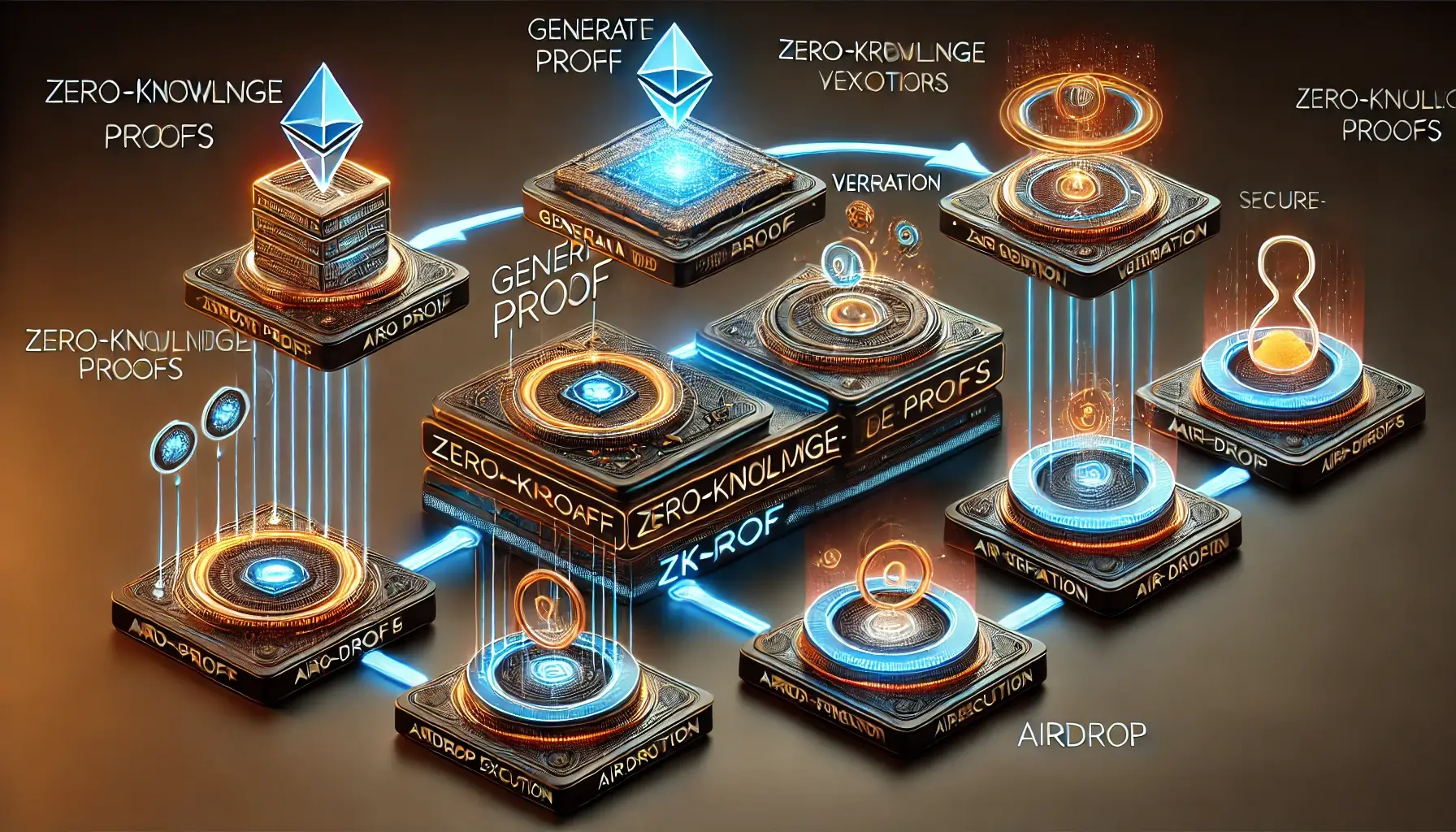Airdrops have become a popular tool in the crypto world, enabling projects to distribute tokens, reward communities, and increase engagement. However, as the crypto space matures, privacy concerns are also growing. Many airdrop campaigns now require KYC (Know Your Customer) verification, asking participants to provide personal information like their ID or address to prove eligibility. While KYC helps ensure compliance and security, it can deter privacy-focused users who value anonymity and decentralization.
Zero-knowledge proofs (ZK-proofs) offer an innovative solution to this problem by allowing users to prove their eligibility for airdrops without revealing any personal information. By leveraging ZK-proofs, users can maintain their privacy while still participating in airdrop campaigns. In this article, we’ll dive into how zero-knowledge proofs work, their role in airdrop participation, and the benefits they bring to both users and projects.
1. What are Zero-Knowledge Proofs?
Zero-knowledge proofs are cryptographic methods that allow one party (the prover) to prove to another party (the verifier) that a specific statement is true without revealing any additional information about the statement. In simple terms, ZK-proofs enable users to demonstrate knowledge or possession of certain data without actually disclosing the data itself.
For example, if you want to prove that you are eligible for an airdrop because you hold a certain token, a zero-knowledge proof allows you to verify this without revealing your wallet address or token balance. ZK-proofs provide a way to meet requirements without compromising privacy.
There are two main types of zero-knowledge proofs:
- ZK-SNARKs (Zero-Knowledge Succinct Non-Interactive Argument of Knowledge): These are compact, efficient proofs often used in blockchain applications like privacy coins and privacy-preserving smart contracts.
- ZK-STARKs (Zero-Knowledge Scalable Transparent Argument of Knowledge): These proofs offer enhanced scalability and security, making them suitable for high-complexity applications.
2. How Zero-Knowledge Proofs Enable Privacy-Preserving Airdrop Participation
When used in airdrop campaigns, zero-knowledge proofs can verify eligibility without requiring participants to share personal data. Here’s how ZK-proofs are changing the way users participate in airdrops:
A. Proving Ownership Without Revealing Wallet Details
One common eligibility requirement in airdrops is proving ownership of a certain cryptocurrency or token. Traditionally, users would connect their wallet to an airdrop platform, exposing wallet addresses and transaction histories. However, with ZK-proofs, users can prove that they hold the required tokens without exposing their wallet details. This preserves privacy and enhances security.
For instance, if a DeFi project wants to airdrop tokens to its early users, participants can use zero-knowledge proofs to prove they have previously interacted with the platform without revealing their entire transaction history. This ensures only eligible users receive tokens while keeping their data private.
B. Verifying Geographical Eligibility Without Revealing Location
Some airdrops are limited to certain regions due to regulatory restrictions. Traditionally, this requires users to submit documentation, like proof of residency. ZK-proofs can solve this by allowing users to prove they meet geographical eligibility without sharing their exact location or personal information.
For example, a zero-knowledge proof could allow a user to confirm that they reside within a specified jurisdiction without providing their actual address. This innovation not only preserves user privacy but also helps projects comply with geographical restrictions without collecting sensitive data.
C. Meeting Age or Activity Requirements Without Disclosing Personal Details
Certain airdrops require participants to meet specific requirements, such as age verification or active engagement within a community. Using ZK-proofs, users can confirm they meet these conditions without revealing personal information. For instance, users could prove they are over 18 without sharing their birthdate or personal ID.
For crypto communities that value decentralization and anonymity, zero-knowledge-based verification aligns perfectly with their ethos, allowing projects to validate participants without intruding on their privacy.
3. Benefits of Zero-Knowledge Proofs for Airdrop Campaigns
Using zero-knowledge proofs in airdrop strategies offers numerous advantages, benefiting both participants and project teams:
- Enhanced Privacy: ZK-proofs protect participants’ privacy by preventing unnecessary data exposure. Users can confirm their eligibility while keeping their personal details secure.
- Reduced KYC Burden: For many crypto users, KYC requirements can feel intrusive and complicated. ZK-proofs remove the need for extensive identity verification, making airdrops more accessible.
- Stronger Security: By minimizing data sharing, ZK-proofs reduce the risk of data breaches and identity theft. This security boost helps build trust between users and projects.
- Increased Participation: Privacy-focused users who avoid KYC requirements are more likely to participate in airdrops that offer zero-knowledge verification, increasing community engagement.
- Regulatory Compliance: ZK-proofs allow projects to meet regulatory requirements without directly collecting sensitive data, helping them navigate legal challenges in a privacy-conscious way.
4. Examples of Projects Using Zero-Knowledge Proofs for Privacy-Preserving Airdrops
Some crypto projects are already leveraging zero-knowledge proofs to offer private and secure airdrop campaigns. Let’s look at a few examples:
a. Tornado Cash
Tornado Cash, a decentralized privacy protocol on Ethereum, uses zero-knowledge technology to enable private transactions. Although not specifically an airdrop platform, Tornado Cash demonstrates how ZK-proofs can anonymize on-chain activity, offering inspiration for projects that want to use similar privacy-preserving methods for airdrop eligibility.
b. Manta Network
Manta Network, a privacy-focused blockchain for DeFi, is pioneering ZK-proof technology to ensure private transactions and protect user identities. As Manta Network develops its ecosystem, it is exploring ways to use zero-knowledge proofs for airdrop eligibility, ensuring that participants can join without sacrificing privacy.
c. Mina Protocol
Mina Protocol, known as the “lightest blockchain,” uses zk-SNARKs to keep data requirements minimal while maintaining privacy. Mina’s lightweight infrastructure and privacy features make it an ideal candidate for future airdrops that rely on zero-knowledge proofs to confirm eligibility without revealing personal data.

5. Challenges and Considerations of Using Zero-Knowledge Proofs in Airdrops
While ZK-proofs offer exciting possibilities for privacy-preserving airdrops, there are challenges to consider:
- Technical Complexity: Implementing zero-knowledge proofs requires advanced cryptographic expertise. This can be a barrier for smaller projects that lack the resources to develop ZK-based solutions.
- Cost of Implementation: Creating ZK-proofs, especially ZK-SNARKs, can be computationally expensive. Projects may need to invest in infrastructure or pay transaction fees associated with zero-knowledge verification.
- User Education: Many crypto users are unfamiliar with zero-knowledge technology. Projects need to educate participants on how ZK-proofs work to build trust and encourage adoption.
Despite these challenges, the potential benefits of ZK-proofs for privacy-preserving airdrops are substantial. As zero-knowledge technology continues to advance, we can expect more projects to adopt it, enhancing privacy and security for crypto users.
Conclusion
Zero-knowledge proofs are transforming the way airdrops are conducted in the crypto world. By allowing users to prove eligibility without revealing personal information, ZK-proofs offer a unique balance between privacy and compliance. This technology is empowering projects to design airdrop campaigns that align with the values of decentralization and anonymity—core principles of the crypto community.
As more projects embrace zero-knowledge technology, we’re likely to see an increase in privacy-focused airdrops, making it easier for users to participate without sacrificing their security. In a world where data privacy concerns are growing, zero-knowledge proofs provide a much-needed solution, helping crypto projects attract privacy-conscious participants and build trust within their communities.
For more insights on privacy-focused solutions in the crypto space, visit our Cryptocurrency Comparisons Guides.
Stay Updated
For the latest updates on zero-knowledge proofs and privacy-preserving airdrops, follow us on:
Stay informed with the latest crypto insights at FreeCoins24.io.
Special Offer
Want to trade tokens from privacy-preserving airdrops? Sign up on Bybit today and enjoy up to $30,000 in deposit bonuses! Trade with confidence on a top crypto platform.
Home Using Zero-Knowledge Proofs to Participate in Airdrops

















